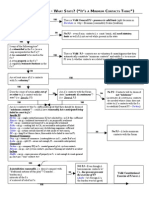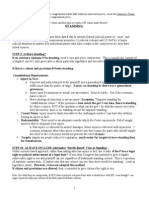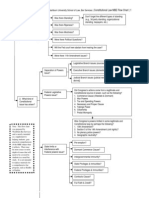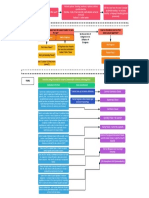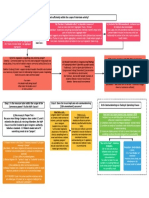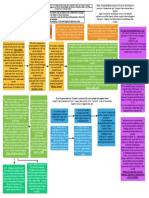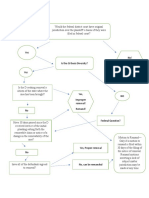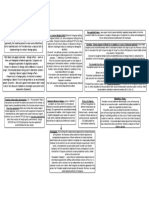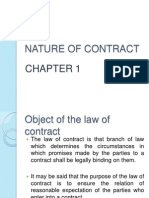Negligence Analysis
Negligence Analysis
Uploaded by
Brat WurstCopyright:
Available Formats
Negligence Analysis
Negligence Analysis
Uploaded by
Brat WurstOriginal Description:
Copyright
Available Formats
Share this document
Did you find this document useful?
Is this content inappropriate?
Copyright:
Available Formats
Negligence Analysis
Negligence Analysis
Uploaded by
Brat WurstCopyright:
Available Formats
Standard narrowed for physically disabled, children (not mentally disabled!).
In
1. Zone of Danger
emergency situations, act as a reasonable person in that emergency.
2. Relationships
NEGLIGENCE 3. Public Policy
Professional standard of care: professional must exercise the requisite degree
4. Misfeasance
ANALYSIS Is a duty owed? of learning, skills, and ability of that calling with reasonable and ordinary care.
Generally, not to expose Custom: not a duty in itself, but evidence of a reasonable common practice can
foreseeable victims to an show a reasonable person would've followed it
What is the unreasonable risk of harm - to
act as a reasonable person Statute: can impose a duty to comply in cases where safety statute, P in class of
duty? would. people protected by statute, suffered harm statute designed to prevent
Duty
Invitee (business purposes): duty to keep premises reasonably safe and inspect for latent defects
Licensee (Social Guest): no duty to act to keep premises safe, just warn of hidden dangers known to host and refrain from
Affirmative/Heightened hurting licensee
Duties Trespasser:generally no duty until you discover them or have reason to except them (diff. for children)
Landlord to Tenant: generally, no duty, six exceptions (no duty to social guests either)
NO DUTY OWED Rescue: no duty to rescue, but if you voluntarily undertake a rescue, you assume a duty to proceed in a
WHEN: pure non-negligent manner
economic harm or
emotional distress
If you caused the harm or what caused the harm is under your control, duty
without physical
Special Relationships: to render assistance
symptoms (unless
bystander) Duty to warn a third party if you know of a specific danger to that specfic
plaintiff
B < PL: likelihood that conduct will cause harm + gravity of harm outweigh Common carriers to passengers, innkeepers to guests, public utilities,
the burden, so a reasonable person would have taken precautions business/possessor of land with premises open to public, employer to
employees who are in imminent danger or injured and helpless
Social utility: does the social utility of the conduct outweigh the harm?
Special relationship can arise between parties if one party has control ability
Social utility argument can fail if harm is very severe.
over person/area and other doesn't and therefore, D should've taken
measures to protect P (sex abuse case)
Custom can be indication of how a reasonable person would act. If they
Breach deviated from established custom, P can argue evidence of unreasonable
person. If D complied, maybe the whole industry is wrong and the custom
is unreasonable.
Circumstantial evidence (such as constructive notice) and Rep Ipsa Loquitor can be used to show
breach.
Violation of a safety statute or regulation can establish breach if P was in class statute designed to
D can argue that's not necessarily true, exact
protect and harm was of kind designed to prevent. cause of harm was undetermined, could have
been due to other D. P can argue that had
they done X, the harm wouldn't have occurred
either way.
But for Test: but for your negligent act, my harm wouldn't have occurred.
Cause in Fact Types:
1. Joint & Several Liability (multiple sufficient causes)
Substantial Factor Test for Concurrent Causes
2. Market Share Liability (fungible products)
3. Multiple actions caused uncertainty
D will argue superseding or intervening cause was
Foreseeability: it was foreseeable that your act would cause harm, so the exact
not foreseeable, so he didn't cause the harm
Proximate manner in which that harm occurs is irrelevant
Cause Direct, Natural, Immediate: harm was a direct, natural, immediate result of your
D will argue harm is too remote, too attenuated in
actions
time and space (work retrospectively, find break in
chain)
Superseding Criminal Act often cuts off
liability unless risk is what made D neg.
1. Unlimited liability would destroy civilization
2. Insurance available?
Public Policy
3. Avoid "ruinous liability" when damages are that great
4. However, is there a public policy reason to hold liable?
To person or property
1. In zone of danger Example: P's act was a failure to exercise reasonable care,
Harm Purely emotional
2. Related to victim by blood or
marriage
and his negligence is the superseding cause.
distress if physical
3. Distress was severe and
manifestation
beyond what a reasonable
emotional response would be Example: When P did X, he P can argue if no other
Bystander Test for voluntarily and knowingly options = not voluntary;
emotional distress from assumed the risk of doing so. he didn't know of risk.
Comparative Negligence
witnessing
Assumption of Risk Immune from intentional torts, discretionary acts, libel/slander
Plaintiff's Conduct Employees can be sued for 1) negligent/wrongful acts 2) within scope
of employment 3) not discretionary
Parental Immunity for neg.
supervision
Affirmative Not immune for MINISTERIAL ACTS - operational level, no
judgment/choice made
Defenses Charities (mostly abolished)
Immunity for discretionary acts, legislative and judicial decision making,
Federal Gov. NOT IMMUNE FOR MINISTERIAL ACTS
State agencies: usually immune, unless private function - sometimes
No duty to protect a specific individual unless relationship develops; not
Immunities State Gov. immune for propriety or private functions
Municipalities Judges, president, governor, legislators have ABSOLUTE immunity for actions on the job
Public Officials Prosecutors, officers, lower level officials have QUALIFIED immunity - can be lost if
reasonable person would know actions are violating a statutory or constitutional right
You might also like
- Civ Pro Flowchart OutlineDocument18 pagesCiv Pro Flowchart OutlineMoshe Shemtov 'student'80% (10)
- FRCP ChartDocument11 pagesFRCP ChartSebastian James100% (7)
- Personal Jurisdiction Flow ChartDocument1 pagePersonal Jurisdiction Flow Chartsebrafan83% (18)
- Con Law Flow ChartsDocument6 pagesCon Law Flow Chartsbiferguson100% (48)
- Con Law Attack SheetDocument24 pagesCon Law Attack Sheetlylid66100% (13)
- ContractsDocument1 pageContractsBrat Wurst100% (2)
- Torts Flowchart Outline BennettDocument6 pagesTorts Flowchart Outline BennettDewey Bennett100% (18)
- Contracts PrewritesDocument22 pagesContracts PrewritesStephanie Haro100% (1)
- Joinder DiagramsDocument1 pageJoinder DiagramsBrat Wurst100% (3)
- Professional Responsibility Attack SheetDocument4 pagesProfessional Responsibility Attack Sheetthanhdra100% (4)
- Negligence Analysis: Is A Duty Owed?Document1 pageNegligence Analysis: Is A Duty Owed?Fernanda Rodriguez Torres100% (13)
- Restrictions On Land UseDocument1 pageRestrictions On Land UseBrat Wurst100% (1)
- Future InterestsDocument1 pageFuture InterestsBrat WurstNo ratings yet
- Con Law FlowchartsDocument11 pagesCon Law Flowchartstdickson1597% (76)
- Ucc 2-207Document1 pageUcc 2-207Brat Wurst100% (1)
- Ucc 2-207Document1 pageUcc 2-207Brat Wurst100% (1)
- ConLaw FlowChartDocument2 pagesConLaw FlowChartAisha Lesley82% (17)
- Property Present EstatesDocument1 pageProperty Present EstatesBrat Wurst100% (1)
- 1L Contracts Exam Outline Checklist Attack SheetDocument2 pages1L Contracts Exam Outline Checklist Attack SheetSara Zamani67% (3)
- Property Present EstatesDocument1 pageProperty Present EstatesBrat Wurst100% (1)
- Con Law Master ChartDocument1 pageCon Law Master ChartBrat Wurst100% (1)
- Property Attack Sheet (Stanford Law)Document9 pagesProperty Attack Sheet (Stanford Law)Swi Masala Dosa100% (8)
- FRCP 26 ChartDocument1 pageFRCP 26 ChartRonnie Barcena Jr.50% (6)
- Answering A Con Law QuestionDocument1 pageAnswering A Con Law QuestionBrat WurstNo ratings yet
- Contracts Attack OutlineDocument5 pagesContracts Attack OutlineAkibaChonolesNo ratings yet
- Criminal Law MPC v. CL ChartDocument17 pagesCriminal Law MPC v. CL Charttgatga100% (8)
- Civ Pro Outline 2021Document71 pagesCiv Pro Outline 2021AmandaNo ratings yet
- Checklist For Civil ProcedureDocument10 pagesChecklist For Civil ProcedureJamesEarl100% (5)
- Erie Doctrine Flow ChartDocument1 pageErie Doctrine Flow Chartdmt320100% (2)
- Personal JurisdictionDocument1 pagePersonal JurisdictionKelly GrillsNo ratings yet
- Constitutional Law Essay Rules For Bar ExamDocument14 pagesConstitutional Law Essay Rules For Bar ExamT Sheth100% (6)
- Torts CheatsheetDocument2 pagesTorts CheatsheetEmma Jane Fabeck100% (1)
- Crim Law ATK OutlineDocument10 pagesCrim Law ATK Outlinegialight100% (4)
- Commerce ClauseDocument1 pageCommerce ClauseBrat WurstNo ratings yet
- Takings FlowchartDocument1 pageTakings FlowchartAmanda100% (1)
- SMJDocument1 pageSMJBrat WurstNo ratings yet
- SSI Under 11thDocument1 pageSSI Under 11thBrat Wurst100% (1)
- Basic Commerce Clause FrameworkDocument1 pageBasic Commerce Clause FrameworkBrat WurstNo ratings yet
- Commerce ClauseDocument1 pageCommerce ClauseBrat WurstNo ratings yet
- Lakas Atenista Civil Procedure 2001Document282 pagesLakas Atenista Civil Procedure 2001norzeNo ratings yet
- Obligations and Contracts: Agabin, P.A., Mestizo: The Story of The Philippine Legal System (2011), Chapter 7, Pp. 169-216Document36 pagesObligations and Contracts: Agabin, P.A., Mestizo: The Story of The Philippine Legal System (2011), Chapter 7, Pp. 169-216Adriana Del rosarioNo ratings yet
- Constitutional Law Attack Outline - Midterm Exam PDFDocument8 pagesConstitutional Law Attack Outline - Midterm Exam PDFWilliam Chanes MartinezNo ratings yet
- Torts Outline Complete W/ ChartsDocument95 pagesTorts Outline Complete W/ ChartsPriscilla Quansah100% (1)
- Attack OutlineDocument3 pagesAttack OutlineSam Rodgers100% (2)
- Torts I Outline ElementsDocument14 pagesTorts I Outline Elements77bribri77No ratings yet
- Present and Future Estates OutlineDocument4 pagesPresent and Future Estates OutlineTripp Rush100% (2)
- Joinder-Big Picture: R J I R Diver TyDocument1 pageJoinder-Big Picture: R J I R Diver Tysafkdjafgh leeeNo ratings yet
- ENS CivPro Attack OutlineDocument4 pagesENS CivPro Attack OutlineseabreezeNo ratings yet
- Torts Negligence OutlineDocument21 pagesTorts Negligence OutlineAmandaNo ratings yet
- Contracts Attack OutlineDocument6 pagesContracts Attack OutlineShannon LitvinNo ratings yet
- Removal FlowchartDocument1 pageRemoval FlowchartAmandaNo ratings yet
- Torts Overview ChartDocument6 pagesTorts Overview ChartMeredith Muller100% (1)
- 1L Civ Pro OutlineDocument30 pages1L Civ Pro OutlineDanny Bencivenga100% (4)
- P ReclusionDocument1 pageP ReclusionBrat WurstNo ratings yet
- Contracts Essay OutlineDocument12 pagesContracts Essay OutlineGeneTeam100% (6)
- Civ Pro Rules Flow ChartDocument27 pagesCiv Pro Rules Flow Chartno contract100% (2)
- Property Outline Fall 2020Document46 pagesProperty Outline Fall 2020Alyssa Morris100% (1)
- Torts 1 Rule StatementsDocument8 pagesTorts 1 Rule StatementsNija Anise Bastfield100% (3)
- Impleader DiagramDocument1 pageImpleader DiagramBrat WurstNo ratings yet
- Rule Chart (Final)Document14 pagesRule Chart (Final)Anna Chae100% (2)
- Erie Flow ChartDocument1 pageErie Flow ChartDhvanil Zaveri100% (2)
- Business Organizations: Outlines and Case Summaries: Law School Survival Guides, #10From EverandBusiness Organizations: Outlines and Case Summaries: Law School Survival Guides, #10No ratings yet
- Torts OutlineDocument3 pagesTorts OutlineevanwilsonNo ratings yet
- Negligence OlDocument13 pagesNegligence OlBurnsy BeatsNo ratings yet
- Torts Term SheetDocument13 pagesTorts Term SheetmebernstNo ratings yet
- Negligence AttackDocument2 pagesNegligence AttackHannah MessickNo ratings yet
- Common Law v. MPC Chart-TEVADocument8 pagesCommon Law v. MPC Chart-TEVAtml.subberNo ratings yet
- Hegel-Daughter Goes To College Does Drugs, Parents Sue SchoolDocument4 pagesHegel-Daughter Goes To College Does Drugs, Parents Sue SchoolMichael PerenichNo ratings yet
- Torts 2 Outline Spring20Document64 pagesTorts 2 Outline Spring20Amelia Poore100% (1)
- Allocation of Foreign Policy PowerDocument1 pageAllocation of Foreign Policy PowerBrat WurstNo ratings yet
- To The States, Are Reserved To The States Respectively, or To The People."Document1 pageTo The States, Are Reserved To The States Respectively, or To The People."Brat WurstNo ratings yet
- Executive Powers - Page 1Document1 pageExecutive Powers - Page 1Brat WurstNo ratings yet
- Civil War Enforcement PowersDocument1 pageCivil War Enforcement PowersBrat WurstNo ratings yet
- Steel Seizure FrameworkDocument1 pageSteel Seizure FrameworkBrat WurstNo ratings yet
- Class Action - Rule 23 To Be Certified, Must Meet 23A Requirements & Fit Into A 23B - Not Class Action Until Court Certifies It As SuchDocument1 pageClass Action - Rule 23 To Be Certified, Must Meet 23A Requirements & Fit Into A 23B - Not Class Action Until Court Certifies It As SuchBrat Wurst100% (1)
- Republic of The Philippines Supreme Court ManilaDocument24 pagesRepublic of The Philippines Supreme Court ManilaAlan Vincent FontanosaNo ratings yet
- Shareholders Loan AgreementDocument29 pagesShareholders Loan Agreementjcarpen33100% (1)
- Rule 10 Amended Supplemental PleadingDocument5 pagesRule 10 Amended Supplemental PleadingIrin200No ratings yet
- PMMSI vs. CADocument1 pagePMMSI vs. CAKurisuchan Damnit100% (2)
- Ucl3612 Company Law I Tri 1, 2020/2021 Tutorial Topic 2: Promoters and Pre-Incorporation ContractsDocument7 pagesUcl3612 Company Law I Tri 1, 2020/2021 Tutorial Topic 2: Promoters and Pre-Incorporation ContractsClara SusaieNo ratings yet
- Delgado Vda. de de La Rosa vs. Heirs of Marciana Rustia Vda. de Damian 480 SCRA 334, January 27, 2006Document20 pagesDelgado Vda. de de La Rosa vs. Heirs of Marciana Rustia Vda. de Damian 480 SCRA 334, January 27, 2006TEtchie TorreNo ratings yet
- Remedial Law PreliminariesDocument12 pagesRemedial Law PreliminariesLex LimNo ratings yet
- Aala Vs Uy, GR No. 202781Document3 pagesAala Vs Uy, GR No. 202781Pauline LicaycayNo ratings yet
- Remedies AssignmentDocument1 pageRemedies AssignmentGeorge IsabellaNo ratings yet
- OBLICON (Art. 1315-1319)Document2 pagesOBLICON (Art. 1315-1319)Karen Joy MasapolNo ratings yet
- Litonjua v. EternitDocument2 pagesLitonjua v. EternitWinterBunBunNo ratings yet
- Wills and Succession - NotesDocument160 pagesWills and Succession - NotesMaria Divina Gracia D. MagtotoNo ratings yet
- Doctrine of Election PDFDocument13 pagesDoctrine of Election PDFPujit75% (4)
- Cases On PLedgeDocument12 pagesCases On PLedgePaulo San JuanNo ratings yet
- Mindanao Terminal v. Phoenix Assurance (162467)Document4 pagesMindanao Terminal v. Phoenix Assurance (162467)Josef MacanasNo ratings yet
- Remedial Law 2018 UST Preweek PDFDocument22 pagesRemedial Law 2018 UST Preweek PDFJohnny Johnny Yes Papa SinsNo ratings yet
- Criminal Cases and InsolvencyDocument2 pagesCriminal Cases and Insolvencyhaze_toledo5077No ratings yet
- Sarabia & Compil Case DigestsDocument3 pagesSarabia & Compil Case DigestsJin YangyangNo ratings yet
- Article 1305 - 1318Document2 pagesArticle 1305 - 1318Giana JeanNo ratings yet
- 08b Format For PBGDocument2 pages08b Format For PBGsri projectssNo ratings yet
- Sabido v. IACDocument10 pagesSabido v. IACChristopher Martin GunsatNo ratings yet
- 63 - Malayan Insurance Co Vs Alberto, GR No. 194320, February 1, 2012Document1 page63 - Malayan Insurance Co Vs Alberto, GR No. 194320, February 1, 2012perlitainocencioNo ratings yet
- 17 - Solidbank Corporation vs. Mindanao Ferroalloy CorporationDocument10 pages17 - Solidbank Corporation vs. Mindanao Ferroalloy CorporationanajuanitoNo ratings yet
- Mendoza vs. Laxina, Sr. G.R. No. 146875. July 14, 2003.Document11 pagesMendoza vs. Laxina, Sr. G.R. No. 146875. July 14, 2003.VKNo ratings yet
- 5 G.R. No. 180284 - Salas v. MatusalemDocument3 pages5 G.R. No. 180284 - Salas v. MatusalemAndelueaNo ratings yet
- (PROPERTY) Red Cases Pt.3Document31 pages(PROPERTY) Red Cases Pt.3Liee RaineNo ratings yet
- 38 - Florentino v. EncarnacionDocument18 pages38 - Florentino v. EncarnacionThirdymon PundeNo ratings yet
- Nature of ContractDocument27 pagesNature of ContractKailash KhatriNo ratings yet


